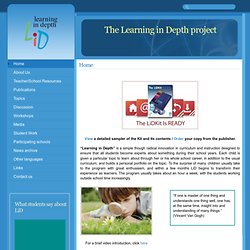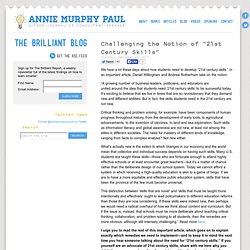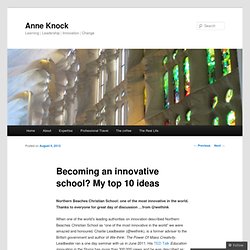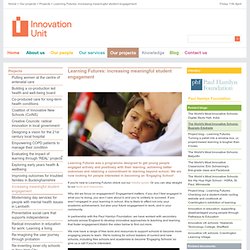

Splogs. The Learning in Depth project. Learning in Depth (LiD) is an unusual program and tends, after the first simple description, to elicit enthusiasm from some people and hesitation from others.

While the basic idea is quite simple, we think the potential implications of the program for students, teachers, and schools are profound. In most of our literature we suggest beginning LiD as children start school. This is the ideal, but not always possible for many teachers. If you teach grade 6, for example, and are attracted by LiD, there is no reason not to start then. At the moment there are LiD programs beginning in all grades in some schools somewhere, even grade 12. “LiD has changed my children!!! “The kids love it!” (David Futter, teacher in Victoria, B.C.) “I have never experienced the kind of questions and interactions I now have with my students . . . (Linda Holmes, teacher in Langley, B.C.) (Sheri Dunton, teacher in Corbett, OR) Innovation_book_chapter. Constructing your classes: putting pupils in the driving seat. A year ago I kicked off my new iGCSE physics course by handing out the syllabus and asking two questions: "What do you know already?

" followed shortly afterward by "OK, so where shall we start? " After some group discussion we mapped out a rough path through the headline topics, formed some teams and got started. Fast forward to this week when I received an email from Taran, now in year 11. He attached a spreadsheet with a timeline showing all the lessons between now and the exam in June. He mapped across all the topic areas we still haven't covered suggesting a sequence for the lessons, leaving time for consolidation, tests and revision. Meanwhile, Henry and Sean have taken the books in for marking this weekend.
Looking ahead, Max and Anujan are starting to plan their unit on motors and generators. This is all part of the co-construction process I am exploring along with some colleagues. The outcomes are amazing. Untitled. What 100 Experts Think About The Future Of Learning. If you’re an educator, surely you know that technology has and will continue to have an incredible impact on learning.

Whether it’s the Internet, innovative learning tools, or teaching technology itself, these two subjects are intertwined. In these talks, you will find essential information for educators concerned with technology. General Learn about making technology work in education and more in these talks. Rethinking the Student Experience in the 21st Century Public Research University: See how a diverse student body and technology can make a difference in the student experience today. Sharing Education These talks explore the idea of open, shared education. Hector Ruiz on Connecting the World: Hector Ruiz lectures on Internet access for everyone. Creativity & Innovation Watch these talks to see how you can foster innovation and the creative spirit. Ken Robinson Says Schools Kill Creativity: Ken Robinson’s lecture makes a case for a more creative education system. Challenging the Notion of “21st Century Skills” Thursday, September 27, 2012 We hear a lot these days about how students need to develop “21st century skills.”

In an important article, Daniel Willingham and Andrew Rotherham take on the notion: “A growing number of business leaders, politicians, and educators are united around the idea that students need ’21st century skills’ to be successful today. It’s exciting to believe that we live in times that are so revolutionary that they demand new and different abilities. But in fact, the skills students need in the 21st century are not new. Anne Knock: Learning everywhere today. Northern Beaches Christian School: one of the most innovative in the world.

Thanks to everyone for great day of discussion …from @wethink When one of the world’s leading authorities on innovation described Northern Beaches Christian School as “one of the most innovative in the world” we were amazed and honoured. Charlie Leadbeater (@wethink), is a former adviser to the British government and author of We-think: The Power Of Mass Creativity. Leadbeater ran a one day seminar with us in June 2011. His TED Talk Education innovation in the Slums has more than 300,000 views and he was described as: early to notice the rise of “amateur innovation” – great ideas from outside the traditional walls, from people who suddenly have the tools to collaborate, innovate and make their expertise known.
Cramlington. innovation. Rules. We Wanted To Talk About 21st Century Education. Learning Futures: increasing meaningful student engagement. Learning Futures was a programme designed to get young people engaged actively and positively with their learning, achieving better outcomes and retaining a commitment to learning beyond school.

We are now looking for people interested in becoming an 'Engaging School'. If you're new to Learning Futures check out our helpful guide. Or you can skip straight to our tools and resources. Why did we focus on engagement? Engagement matters: if you don’t feel engaged in what you’re doing, you won’t care about it, and you’re unlikely to succeed. In partnership with the Paul Hamlyn Foundation, we have worked with secondary schools across England to develop innovative approaches to teaching and learning that foster engagement.Watch the video below to find out more. Charles Leadbeater: Education innovation in the slums.